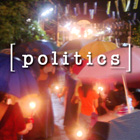
|
ARISTIDE UNDER ATTACK, APPARENTLY FOR POLICIES FAVORING MAJORITY POOR
18 January 2004 The nonpartisan, nonprofit Council on Hemispheric Affairs, after investigating events on the ground in Haiti, has released a memorandum citing "unfair and indecent diplomacy" as key to the ongoing political tension. The report notes systematic unwillingness by the well-financed opposition to enter a legitimate democratic process, and Washington's continued opposition to sending aid to the hemisphere's poorest country, as part of what appears to be a return to policies that restored the Duvalier dictatorship in 1991. President Aristide has proposed holding new elections, in order to restore the democratic mandate to parliament, in which one-third of terms have expired during unrest. The opposition had refused to participate and demands Aristide's ouster. There has been violence spilling into the streets for months now, with politically motivated killings apparently on the rise. Though the international community unwaveringly recognizes the legitimacy of the elections that brought Aristide to office, it is the refusal to assist his democratic reforms that appears to be undermining his presidency. The CoHA report identifies outdated Cold War political filters as working against Aristide's reforms, suggesting influential US analysts view Aristide as "little more than a beardless Castro". The comparison stems from Aristide's commitment to the poor population of Haiti, the most destitute in the Americas. Aristide started out as a Catholic priest and community activist, who opposed human rights abuses and authoritarian rule under Haiti's brutal juntas. His popularity with the poor stems from his long-term commitment to their cause. Opposition forces are comprised of a ruling elite, which many independent observers say longs for a return to the favors of authoritarian, one-party rule. The reform policies of Aristide's government are a nuisance to wealthier Haitians who enjoyed a degree of privilege beyond their material assets under the Duvalier dictatorships. But their being a nuisance does not make his policies a threat to democracy, much less communist in nature. With a majority poor population, Haitian democracy would have to consider the plight of the poor in order to be legitimately democratic. The country has been choked by 200 years of lopsided economic policies, which have prevented the advance to true democratic rule and to economic fairness and sustainability. CoHA cites the record of the US government in blocking desperately needed development aid to Haiti:
The report further notes the US record of providing generous support to the Duvalier regimes, with their abysmal treatment of democratic Haitians. The current crisis includes a number of other distortions, including widespread international reporting of events as presented by opposition groups. In one incident, on 5 December 2003, violence broke out at a gathering of opposition students, where pro-Aristide students demonstrated outside. The violence has been widely credited to the Aristide supporters, though witnesses say the violence "began when 50 armed men—not students—entered university facilities and then began to taunt Lavalas supporters standing outside, seriously injuring one with a rock fired by a slingshot." Allegations of incitation go further, including claims that the opposition bribed students to demonstrate against Aristide. The CoHA report concludes that current US policy is contributing to the atmosphere of deprivation and unrest, undermining the popular and democratically elected Aristide government. Furthermore, it would appear that the instability brought about by this "unfair and indecent diplomacy" is then used by Washington as an excuse to deny aid to Haiti. [s]
|
||||||
|
|||||||
